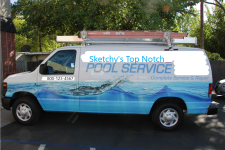What is this white chalky paste on the top of the pool tiles (which does not react by bubbling with concentrated muriatic acid)?

In the past few weeks I've used a few cases of HASA muriatic acid to clean the tiles which bubbled like crazy on the bottom half, presumably calcium carbonate.

The bottom half of the tiles seemed to be calcium carbonate (based on dissolving in acid), but what can this un-reactive white paste be?

And how would you clean off the white paste on top which does not react with muriatic acid?

In the past few weeks I've used a few cases of HASA muriatic acid to clean the tiles which bubbled like crazy on the bottom half, presumably calcium carbonate.

The bottom half of the tiles seemed to be calcium carbonate (based on dissolving in acid), but what can this un-reactive white paste be?

And how would you clean off the white paste on top which does not react with muriatic acid?




